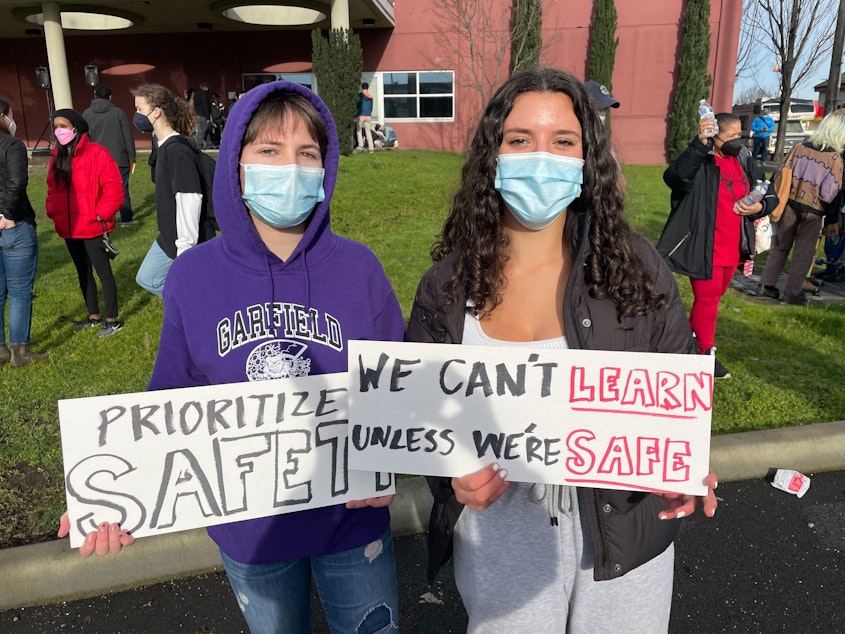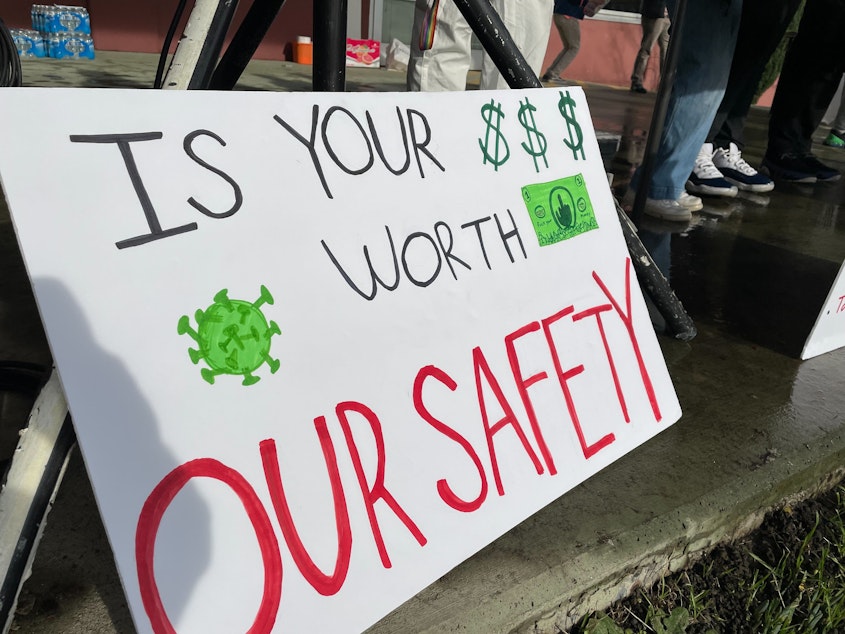Some Washington schools are shifting back to remote learning. What's the plan?

It’s a confusing and frustrating time for students, parents and teachers across Washington state.
In many cases, they don’t know from one day to the next whether school will be in-person, remote, or cancelled all together, amid the height of the Omicron surge.
On Friday, Jan. 14, about 100 Seattle Public Schools students gathered in front of the district’s headquarters to demand more transparency from school officials, and implement better Covid safety measures in the classroom.
A group of Cleveland High School seniors said they launched the idea of the rally in their ethnic studies class. Other students from across the district joined in.
“We have been in person the entire school year, and we have had three educator-organized sick outs so far," said co-organizer Nya Spivey. "And when those things happen, we only get notice late, the night before. So for a lot of people its been like ‘Well, do I go to school tomorrow, or do I not go to school tomorrow?’”
Spivey says that along with stronger communication from district leaders, students are demanding expanded mental health resources, more PPE and testing resources, as well as a change to the state’s 180 day in-person instruction requirements. Students would also like to meet with Gov. Jay Inslee to discuss these issues.
Sponsored
Rena Mateja Walker Burr also goes to Cleveland High School. She spoke directly to district leadership during her speech.
“We shouldn’t have to fight for our education or our lives. But we continue to be pawns in a political game that has nothing to do with us, but has everything to do with the fact that we don’t have what we need to learn, be safe, or thrive in schools.”
Seattle Public Schools Superintendent Dr. Brent Jones observed part of the rally, but declined to speak to the media. The district did release a written statement, saying in part “we recognize the fear and anxiety around this dramatic increase in Covid-19 cases in our community. SPS will not compromise the health and safety of students and staff.”
Dr. Jones also spoke to a couple of students at the rally, like Natalya McConnell. She was left disappointed by her conversation with the superintendent.
“He has no plan to implement our demands. And that’s shameful. It was performative to come here. He wanted to show youth that he’s listening to us,” McConnnell said. “But the way to show us that he’s listening to us is by implementing our demands for N95 masks for all; for weekly required Covid testing and for vaccines, and he has shown that he does not plan to do that.”
Sponsored
District officials are listening to student demands, according to KUOW reporter Ann Dornfeld. As of this week, a limited number of KN95 masks will be available to students, however, a district official said plans to distribute masks were in place ahead of the protest.


School closures across Washington
Sponsored
Seattle Public Schools isn’t the only district in Washington that’s experiencing Covid-related school closures and temporary shifts to remote learning.
Six schools are currently implementing remote learning in the Northshore School District, led by Superintendent Dr. Michelle Reid. Those closures are due in part to high Covid case numbers, and staff call outs.
“We continue to try to keep schools open even with the exponentially increasing numbers until we don’t have staff available to safely run schools,” Reid said.
In Vancouver, a shortage of bus drivers has pushed the school district to rotate school closures.
“We were getting to the point where because of the number of drivers that maybe were calling in sick that morning, it was impacting pickup times and just felt like that was not responsible […] having little ones out waiting for potentially not a bus,” Vancouver Public Schools Superintendent Dr. Jeff Snell said.
Sponsored
Decisions about when a school or district shifts to remote learning is made at the local level, not a state level. State Superintendent Chris Ryekdal says at this time the governor and state department of health have determined that now isn’t the time for broad sweeping policies around school closures or shifts to remote learning.
“I think the governor and the state Department of Health and myself have concluded this is not a time for big broad sweeping policy, you can't even pick now with omicron, sort of a case rate, because so many folks are vaccinated, they may be asymptomatic,” Reykdal said. “It isn't as predictive as, say, hospitalizations, or suddenly loss of life. And thankfully, those would be coupled a lot. So as we come out of it, we're going to come out of it with local decisions, where cases are really in trouble, or their bus driver shortages, or staff shortages and other places, that just isn't the case at all, and they need to be able to make the local decision to stay in their traditional in-person model.
When asked whether staff shortages related to omicron have changed expectations for the rest of the school year, Supt. Reykdal doubled down on the state’s policy of 180 days of instruction.
“In some places, kids don't have access to technology or they live in a place that just quite literally doesn't have broadband. In which case you can cancel school like you would a snow day or flood disaster and you can make the days up,” Reykdal said. “But this all starts with the fact that our state has a positive civil right of days and hours for instructional time. And we're not going to come off that.”






